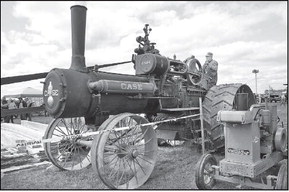Seeds of hope
UW Extension agent Richard Halopka told us this past week that Marathon County farmers, facing astronomically high prices for inputs, including fertilizer, seed and fuel, will, nevertheless, roll the dice on another crop year and plant corn, soybeans and forages this spring. They will bank on good weather to cash in on high grain and milk prices later this fall.
It’s a gamble that will have world-wide repercussions. The farmers, in producing food, strike a blow against the Russians in their attempt to restore their empire by conquest of Ukraine.
The European Commission on Tuesday accused the Russians of trying to provoke a global food crisis by targeting Ukrainian grain warehouses, ports and other storage facilities in its three-month old war. Ukraine supplies the world with 12 percent of its wheat, 15 percent of its corn and half of its safflower oil. Millions of people face food insecurity as staples, such as wheat, have doubled in price because of the war in Ukraine.
Every bushel of corn and soybeans raised by American farmers feeds a global coalition of nations opposed to Russian aggression.
Plentiful crops in the United States will hopefully reverse a 13 percent increase in global food prices that followed Russian president Vladimir Putin’s decision to send tanks, troops, fighter jets and artillery into the former USSR republic.
Spring planting in central Wisconsin has yet a further consequence. It helps the world battle global warming.
When we think about reversing global warming, we typically think of batteries, solar panels, carbon credits, windmill zoning, electric cars, charging stations and cobalt mines in Africa.
But a green future will demand more than just retooling our economy. It will require, as the Ukrainian war shows so plainly, defeating leaders of petro states who, seeing the end of the fossil fuel era, now use their wealth to grab territory or seize some other geopolitical advantage. It means defeating, even on the battlefield, every corrupt, crazy dictator in the world who leverages oil revenue for power.
The battle against petro bullies, however, is never a straightforward thing.
On May 11, President Joe Biden announced he will double to $500 million a federal subsidy for fertilizer production in order to lower costs and boost availability for farmers. The goal is for U.S. farmers to “maximize yields” in order to expand exports and replace food rotting on the docks of Odessa. The president, too, will seek to add another 681 counties where farmers can buy double crop insurance. This, too, is to help American farmers, as the “breadbasket of democracy,” maintain civil order in food-threatened countries around the globe.
We can only shudder to think of the environmental costs of Biden’s policy. Much of that extra fertilizer will wind up in American lakes, rivers and streams. Double cropping will lead to erosion. The extra tillage will release more carbon into the atmosphere.
Yet, the free world cannot allow Putin or any other fossil fuel strongman to use oil and gas in a blackmail scheme to enslave democracies. Surface water pollution must be the short term cost in our attempt to defeat Putin and, eventually, wriggle free of our addiction to oil.
In the next couple of weeks, central Wisconsin farmers will plant corn and soybeans just like they have for decades.
This year, the simple act of planting a seed is a big deal. It sends a powerful message across an increasingly interconnected world. The seed represents more than hope for a plentiful, prosperous harvest. It represents hope for those whose lives are disrupted by war. And it also represents a needed step in the difficult struggle for a cooler, greener planet.


